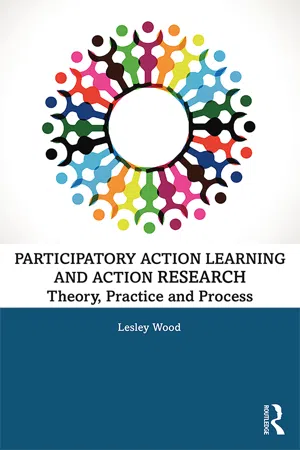
Participatory Action Learning and Action Research
Theory, Practice and Process
- 210 pages
- English
- ePUB (mobile friendly)
- Available on iOS & Android
About this book
Participatory Action Learning and Action Research offers a concise yet comprehensive explanation of the theory, practice and process of this emerging paradigm, methodology and theory of learning. PALAR is a transformative, collaborative and democratic process for resolving complex problems within the context of sustainable professional, organisational and community development. The book draws on real-life examples from socially and economically challenged contexts, and features critical reflections on the strengths and challenges of this evolving methodology in relation to the increased interest in community engagement and project-based learning among institutions of higher education. Analysing theory in the context of sustainable professional, organisational and community development, this book:
- Provides a comprehensive, research-based manual on the use of PALAR within actual research projects.
- Explains a means of engaging in research that promotes the mobilisation of human potential relevant in a rapidly changing society.
- Addresses the challenges of doing participatory research within institutions.
- Provides applied, specific examples of how PALAR can be adapted for use in socially and economically challenged contexts, typical of developing economies.
- Offers critical reflections by researchers and community participants on the challenges and uses of PALAR.
Innovative, and offering clarity on ethics and research questions, Participatory Action Learning and Action Research will be of interest to both emerging and experienced researchers looking to bring about change at a personal, professional, organisational or community level.
Tools to learn more effectively

Saving Books

Keyword Search

Annotating Text

Listen to it instead
Information
Table of contents
- Cover
- Half Title
- Title Page
- Copyright Page
- Table of Contents
- About the author
- About this book
- Acknowledgements
- Foreword by Ortrun Zuber-Skerritt
- List of figures
- List of tables
- List of abbreviations
- List of appendices and boxes
- 1. PALAR as a transformative, collaborative and democratic approach to educational research
- PART I: Theoretical foundations of PALAR
- PART II: Practice and process of PALAR
- PART III: Reflecting on PALAR
- Author Index
- Subject Index
Frequently asked questions
- Essential is ideal for learners and professionals who enjoy exploring a wide range of subjects. Access the Essential Library with 800,000+ trusted titles and best-sellers across business, personal growth, and the humanities. Includes unlimited reading time and Standard Read Aloud voice.
- Complete: Perfect for advanced learners and researchers needing full, unrestricted access. Unlock 1.4M+ books across hundreds of subjects, including academic and specialized titles. The Complete Plan also includes advanced features like Premium Read Aloud and Research Assistant.
Please note we cannot support devices running on iOS 13 and Android 7 or earlier. Learn more about using the app